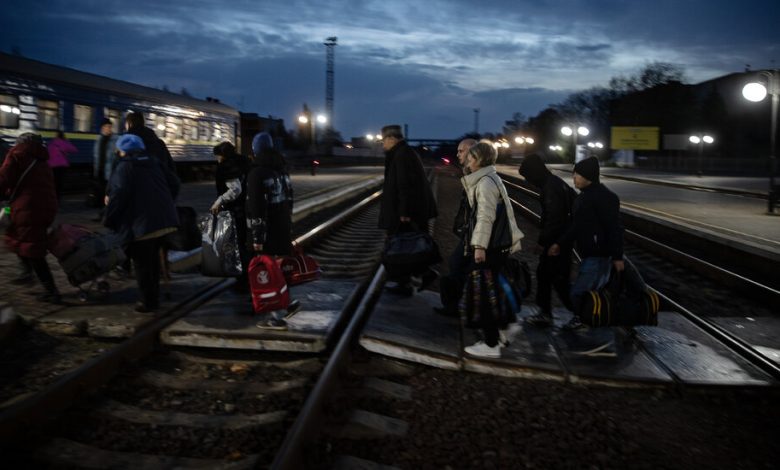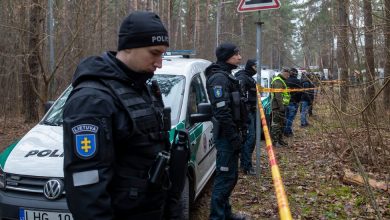They Trudge From Russia Into Ukraine, Fleeing Life Under Occupation

The Russian soldiers turned up at her home close to midnight with an ominous message.
“They said, ‘If in two weeks you don’t have a Russian passport, we will talk to you in a different way,’” recalled Evelina, a social worker who until this month lived under Russian occupation in southeastern Ukraine.
She didn’t wait to have that conversation. Instead, she bundled a few possessions into a suitcase and left with her teenage daughter, heading for territory controlled by Ukraine.
In the Russian-governed lands, she said, it has become so tense that “you are afraid to look out your own window.”
The military deadlock that has settled in across southeastern Ukraine poses a looming security threat to the rest of the country, and menaces Europe with a long period of instability. But for the estimated 4 million to 6 million Ukrainians living in Russian-held areas, as Evelina was, the stalemate means something more dispiriting: an occupation with no end in sight.
Emptied of about half of its population and under the thumb of a harsh military rule, the swath of Russian-occupied territory, an area the size of the Netherlands, is stuck in a distressing state of limbo: run by Russia but recognized by most of the rest of the world as Ukrainian.
Demographics in these regions are changing as working-age people flee, leaving an older and poorer population.
Russian soldiers quarter in abandoned houses and crime has risen. Russian businessmen are strong-arming local business owners into selling stores and farms, and Central Asian migrants have shown up to trade in markets and work as laborers.
Searches are commonplace. Serhiy, 41, who left the city of Enerhodar this month, said his apartment was searched by three soldiers. “One stays in the stairwell with a gun and the other two come inside and go through all your stuff,” he said.

Cots stacked up for use by Ukrainians who have crossed from Russian-governed land back into Ukraine. They sleep overnight, eat, and are debriefed by the authorities before taking a train to Kyiv.
Repression, including torture in makeshift detention sites in basements, targets those who reveal pro-Ukrainian views, altering the political makeup of the area in Russia’s favor but also shifting the cultural landscape away from Ukrainian language and identity.
Russia now controls about 17 percent of Ukrainian land, a half-moon-shaped expanse of farmland, villages and cities in the southeast. The region is off-limits to rights groups and most independent reporters, but accounts by people who have left the occupied areas offer a window into this portion of Ukraine.
Evelina took an unusual but increasingly popular route back into Ukrainian-controlled territory: traveling into Russia and heading north and west, then back into Ukraine through an unofficial border crossing near the northern city of Sumy.
That path is taken by about 100 Ukrainians daily. They hire drivers or take public transportation in Russia to get to the border. From there, they stagger into Ukraine, a thin stream of exhausted families walking two miles on a rutted rural road between the two armies, an unlikely corridor of peace between two nations fighting a violent war.
The armies use the crossing to trade bodies and prisoners, and have negotiated an informal truce that has mostly held, border guards working in the area said. Civilians got word of the site and those with a Ukrainian passport have been piggybacking on the informal cease-fire to escape occupation.
As they arrive, they rest for a time at a school used for interrogations by Ukraine’s intelligence agency, known as a filtration site. In interviews, they described Russian repression and brutality but also functioning local governments and welfare systems, as Russia solidifies control.
For Evelina, fear of arrest and the growing anxiety of her daughter motivated her to leave.
Over the summer, it had seemed her hometown might soon change hands. It lies just 25 miles from the point where a Ukrainian counteroffensive began in June and was intended to push Russia from southern Ukraine. But the attack stalled after about 10 miles.
By the time she left this month, Evelina said, about half the population was accepting of the occupation, having received Russian passports and pension or welfare payments. She declined to identify the town, and like others interviewed for this article, asked that her last name be withheld for security reasons.
They lived, she said, alongside hundreds of Russian soldiers quartered in abandoned houses and newly arrived ethnic Azerbaijanis who sold goods at the local market.
The soldiers’ late-night visit to her home, and their threat — a policing practice other displaced people said is commonplace — terrified her 16-year-old daughter. “She cried, didn’t talk and covered her face with a blanket,” Evelina said.
Typically, the local occupation authorities install a collaborator as a figurehead leader for a local or regional government while a Russian military commandant exerts de facto control over a community.
For economic aid and expertise in municipal and local government, Russia has set up a sister city arrangement where Russian cities pair with those under occupation in Ukraine. The St. Petersburg city government, for example, has contributed some financing to redevelopment in Mariupol, the Azov Sea port city largely flattened in a siege last year. (The city government has said it is helping the Mariupol theater that was bombed last year.)
Occupation administrators have been offered jobs in Russia if they perform well, setting up a career path that encourages capable Russians and collaborators to hold positions in occupied Ukraine. A deputy head of the occupied Donetsk region, for example, became governor of the Siberian region of Omsk in Russia.
Those career opportunities arise for collaborators even if they subject the local population to seemingly underqualified leadership.
A man who had run a business providing Santa Claus actors for holiday parties, for example, became the head of the Donetsk region in 2014, when the Russian army and proxy fighters seized parts of Eastern Ukraine. Last year his wife became deputy head of the Kherson region.
Russia’s occupation policies have also provided economic incentives for collaborators and Russians that blend politics, business and organized crime, according to a study published this fall by David Lewis, a senior fellow at the Royal United Services Institute, a London-based research institute.
“There was a bewildering array of business interests, criminal groups, private military companies and ‘volunteer’ battalions, many of which mixed ideology, warfare and business seamlessly,” Mr. Lewis wrote.
A legal process allows property abandoned by fleeing Ukrainians to be assigned for management to others, typically Russian businessmen.
But Russians manage the occupation principally through repression, leaving behind evidence of detention, torture and killing wherever they have retreated. Volunteers at the crossing point near Sumy say Ukrainians arrive with harrowing accounts of war crimes several times a week.
A woman named Olha described how soldiers had entered her home and beaten her husband with a frying pan, accusing him of belonging to the Ukrainian underground. As they hit him, she said, they yelled, “‘Who are you helping!’”
A devious interrogation technique followed, she said.
The soldiers separated the couple. Olha said they then told her that her husband had confessed to being a spy, encouraging her to also blame him.The husband was arrested and his body later found in a forest outside the town, she said.
More typically, Ukrainians recounted everyday pressure to obtain Russian passports, and told of people being detained if they were overheard speaking ill of President Vladimir V. Putin of Russia.
The Ukrainian authorities say they do not object to Ukrainians obtaining Russian passports to avoid arrest or allow travel.
“Living without a Russian passport in the temporarily occupied territories is very hard and dangerous,” said Ivan Fedorov, the mayor of Melitopol, who fled to Ukrainian-controlled territory in the months after his city was seized by Russian forces.
Tetyana Korobkova, a psychologist who councils those who cross the border in a distraught state, said older people are most often upset about the homes or farms they have left behind, feeling that a lifetime of work has been lost with seemingly little chance now that it will be recovered through Ukrainian military advances.
Young women crossing over have described rapes, Ms. Korobkova said. And parents worry that their children will inadvertently reveal the family’s anti-Russian views while attending school. “They ask children sly questions” in schools, she said. “If the child answers wrong, they will visit the parents.”
Many displaced people find themselves in a kind of emotional limbo, unable fully to commit to new lives in new surroundings, and perhaps hoping they will someday return to their home.
Mykola, 64, fled from Enerhodar, a city on the Dnipro River with a prewar population of about 50,000. About 8,000 people remained, he estimated.
He does not regret leaving. The city and much of occupied Ukraine, he said, is “like the Chernobyl zone,” the area of eerie, empty towns abandoned after the 1986 nuclear disaster.
Billboards in the city, he said, proclaim: “Enerhodar is forever with Russia.”
Yurii Shyvala contributed reporting from Kyiv, Ukraine.




